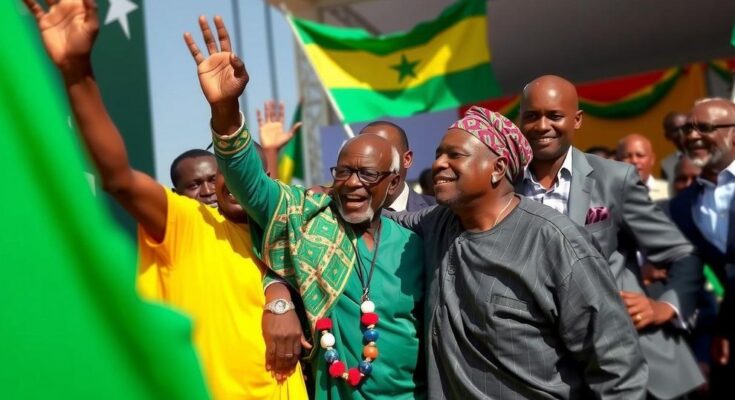Senegal’s ruling Pastef party has declared a significant win in the legislative elections, reporting a peaceful voting process with 90-95% of votes counted. This victory supports President Bassirou Diomaye Faye’s reform agenda aimed at tackling economic challenges, particularly youth unemployment. Opposition claims of electoral fraud highlight ongoing political tensions. The government now faces the task of delivering on promises amid scrutiny of economic conditions.
The ruling Pastef party in Senegal has declared a substantial victory in the recent legislative elections, emphasizing their commitment to a reform-oriented agenda just eight months after coming to power. According to preliminary counts, 90 to 95% of the votes have been reported, reflecting a peaceful voting process throughout the country. Government spokesman Amadou Moustapha Ndieck Sarre lauded the outcome, stating, “I pay homage to the Senegalese people for the large victory that it has given to Pastef.” President Bassirou Diomaye Faye’s party has shown early lead against opposition factions, bolstering its position amid economic challenges that have prompted urgent social reforms. Faye’s ascent to the presidency was marked by promises of economic revitalization and a crackdown on corruption, with a particular focus on addressing youth unemployment—a sentiment echoed by constituents like Pascal Goudiaby, who articulated the pressing need for job creation. Despite these aspirations, the initial months of governance were obstructed by an opposition-led parliament, leading Faye to dissolve the chamber and call for snap elections. Amid claims of a coherent reform agenda, the government faces scrutiny regarding issues of governance and the economy. Youth engagement in voting was highlighted by first-time voter Mademba Ndiaye, who stressed the importance of participation in shaping societal outcomes. Voter turnout was reportedly lower than in previous presidential elections, yet Senegal celebrated its democratic traditions, reaffirming its status as a regional bastion of stability. Clashes were rare as tensions had been simmering prior to the elections. Former president Macky Sall, now in exile, has continued to rally opposition forces, alleging significant electoral fraud without providing specific evidence. These claims highlight the fragmented nature of the current political landscape alongside a backdrop of public discontent over high unemployment and economic disparities. The government has promised reforms in key sectors, as well as enhancements in public policy aimed at strengthening national sovereignty. Nevertheless, external credit agencies have expressed concerns, prompting action from the authorities to rectify financial imbalances.
In the context of West Africa, Senegal has maintained a relatively stable political environment, distinguished by a history of democratic governance. The recent elections were pivotal as they solidified the ruling party’s control shortly after President Bassirou Diomaye Faye’s inauguration. The paradigm shifted when the president dissolved the parliament due to resistance from the opposition, illustrating the tensions that can exist between legislative bodies and executive authorities. The challenges of high unemployment and inflation substantially affect the populace, particularly the youth, and have prompted the government to articulate a comprehensive reform strategy.
In conclusion, the Pastef party’s declared victory in Senegal’s legislative elections represents a consolidation of power and a renewed commitment to addressing critical economic and social issues. While the peaceful conduct of the elections reflects the country’s democratic values, the government is now tasked with overcoming significant challenges, including high unemployment and economic disparities. The opposition’s allegations of fraud and the ongoing economic scrutiny underscore the complexities of Senegal’s political landscape and the importance of credible governance to fulfill electoral promises.
Original Source: www.france24.com




